Russia destroys power and water infrastructure across Ukraine
Kyiv and West denounce attacks as 'war crime', aimed at leaving Ukrainians with no heat and power as winter arrives
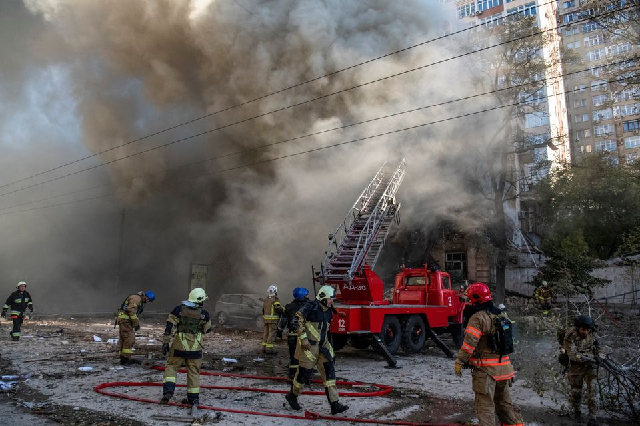
Russia has destroyed almost a third of Ukraine's power stations in the past week, President Volodymyr Zelenskiy said on Tuesday, as Moscow rained more missiles down on infrastructure in what Kyiv and the West call a campaign to intimidate civilians.
Missiles struck power stations in the capital Kyiv where they killed three people, and in Kharkiv in the east, Dnipro and Kryvyi Rih in the south and Zhytomyr in the west, causing blackouts and knocking out water supplies. One man was killed in his flat that was destroyed in Mykolaiv in the south.
Russia has openly acknowledged targeting Ukraine's energy infrastructure with waves of missile and drone strikes since the start of last week, in what President Vladimir Putin said was legitimate retaliation for a blast on a bridge.
Kyiv and the West say intentionally attacking civilian infrastructure is a war crime, and the attacks, aimed at leaving Ukrainians with no heat and power as winter arrives, are Putin's latest tactic to escalate a war his forces are losing.
"The situation is critical now across the country ... The whole country needs to prepare for electricity, water and heating outages," Kyrylo Tymoshenko, deputy head of the Ukrainian president's office, told Ukrainian television.
In Mykolaiv, Reuters heard three explosions in the early hours of Tuesday. A missile completely destroyed one wing of a building in the downtown area, leaving a massive crater. A fire crew was seen pulling the dead body of a man from the rubble.
The Russians "probably get pleasure from this," said Oleksandr, the owner of a nearby flower shop.
Zelenskiy said Russia was continuing to try to terrorise and kill Ukrainian civilians.
"Since Oct 10, 30% of Ukraine’s power stations have been destroyed, causing massive blackouts across the country," he wrote on Twitter.
Zelenskiy reiterated his refusal to negotiate with Putin who he says heads a "terrorist state".
Zelenskiy ruled out negotiations with Putin last month after the Russian leader announced the annexation of four Ukrainian provinces. Putin has also called up hundreds of thousands of reservists and repeatedly threatened to use nuclear weapons since mid-September, after his forces faced humiliating battlefield losses.
'Kamikaze drone'
There was no immediate word on how many people had been killed in Tuesday's strikes overall. A day earlier, Russia sent swarms of drones to attack infrastructure in Kyiv and other cities, killing at least five people.
Moscow denies deliberately targeting civilians, though it has pummelled villages, towns and cities across Ukraine in what it initially called a "special military operation" to disarm its neighbour.
The Russian defence ministry repeated earlier statements that it was carrying out attacks using high precision weapons on what it described as military targets and energy infrastructure across Ukraine.
Ukraine accuses Russia of using Iran-made Shahed-136 'kamikaze drones', which fly to their target and detonate. Iran denies supplying them and on Tuesday the Kremlin also denied using them.
However, two senior Iranian officials and two Iranian diplomats told Reuters that Tehran had promised to provide Russia with more drones as well as surface-to-surface missiles, a move sure to infuriate the United States and its allies.
Ukrainian Foreign Minister Dmytro Kuleba said he would ask Zelenskiy to formally cut diplomatic ties with Iran in protest over the drones. "The actions of Iran are vile and deceitful," he said.
NATO will deliver air defence systems to Ukraine "in the coming days" to help the country defend itself against drones, the alliance's secretary-general Jens Stoltenberg said.
'General Armageddon'
Russia earlier this month named General Sergei Surovikin as overall commander of Moscow's forces in Ukraine. Surovikin, nicknamed "General Armageddon" in Russian media, served in Syria and Chechnya where Russian forces pounded cities to rubble in a brutal but effective scorched earth policy against its foes.
His appointment was quickly followed on Oct 10 by the biggest wave of missile strikes against Ukraine since the start of the war.
Putin cast those strikes as revenge for an explosion that damaged Russia's bridge to Crimea - the peninsula Moscow seized from Ukraine in 2014. Kyiv has not claimed responsibility for that attack but celebrated the destruction of what it considers a military target used to transport arms and troops.
British Armed Forces minister James Heappey told BBC Radio that Surovikin was pursuing a cruel and pointless strategy that he said would fail in its aim of trying to "break the will of the Ukrainian people".
The Kremlin said on Tuesday that four Ukrainian regions it claims to have annexed in recent weeks were under the protection of its nuclear arsenal.
The statement comes as both NATO and Russia prepare to hold annual military exercises to test the readiness of their nuclear weapons forces. Russia's defence ministry said on Tuesday two of its nuclear-capable Tu-95MS strategic bombers had conducted a flight of more than 12 hours over the Pacific Ocean, the Bering Sea and the Sea of Okhotsk.
Putin has previously said he is prepared to use nuclear weapons if necessary to defend Russia's "territorial integrity".
The governors of Russia's Kursk and Belgorod regions, which border Ukraine, on Tuesday reported cross-border shelling.
In Belgorod, a train station was shelled and train links suspended, and two villages were shelled in Kursk, leading to electricity outages, they said.


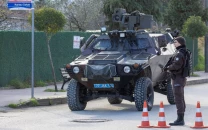


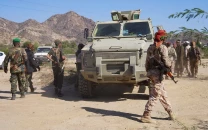

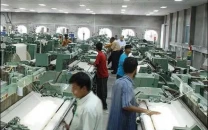
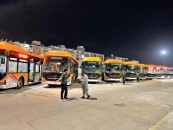
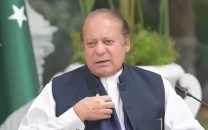
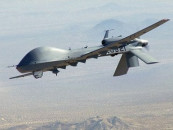

1726134115-0/BeFunk_-(41)1726134115-0-208x130.webp)






COMMENTS
Comments are moderated and generally will be posted if they are on-topic and not abusive.
For more information, please see our Comments FAQ